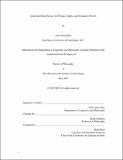Inside the Moral Nexus: On Wrongs, Rights, and Normative Powers
Author(s)
Raty, Anni Aliisa
DownloadThesis PDF (951.4Kb)
Advisor
Schapiro, Tamar
Terms of use
Metadata
Show full item recordAbstract
Common sense morality recognises a distinction between doing something that is wrong, and wronging someone in particular: littering is wrong, but stealing from your neighbour or trampling their flowerbed wrongs them in particular. The difference is that wronging someone is interpersonal or relational in a way that “mere” wrongdoing is not.
In the first chapter, titled “Wrongs without Rights?”, I consider the relation between wronging someone and violating that person’s rights. Most moral philosophers take it for granted that whenever you wrong someone, you violate that person’s rights. Most also take it for granted that someone’s having a claim right against you is equivalent to your being under a duty that you owe to that person in particular—a directed duty, as they are often called. This chapter challenges these orthodox ideas and suggests that to wrong someone is, in the first instance, to violate a directed duty that you owe to that person. I also suggest that directed duties do not always correspond to rights. So wronging someone does not always involve a rights violation.
Consent is a normative power that allows us to alter the duties that others owe to us. By giving consent, we can make it so that something something that would otherwise wrong us, does not. In chapter 2, “The Normative Power of Uptake”, I ague that morally transformative consent requires the consent-recipient’s uptake or acceptance. Consent can’t be given unilaterally by the consent-giver; it requires the recipient’s cooperation.
Chapter 3 is titled “A Joint Decision Account of Consent”. In this chapter I develop a novel account of consent as a kind of joint decision. According to the view I propose, consent is a joint decision that results in the recipient being released from a duty owed to the consent-giver. I argue that this view of consent is better suited to the project of sexual ethics than some of the alternatives: unlike some other views of consent, it does not portray consent as one-sided acquiescence to someone else’s pursuits. The account also guides us to ask important questions about the appropriate ways to negotiate sexual consent.
Date issued
2022-05Department
Massachusetts Institute of Technology. Department of Linguistics and PhilosophyPublisher
Massachusetts Institute of Technology